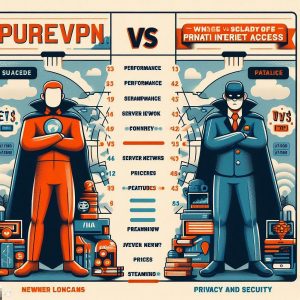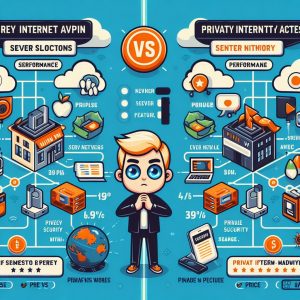Introduction
As online privacy and security become greater concerns, many turn to virtual private networks (VPN) to protect their web traffic from prying eyes. However, with a crowded VPN marketplace overflowing with options, determining which provider best balances performance, features, and reliability often bewilders those seeking these services for the first time.
Two of the longest tenured and most visible consumer VPN providers, PureVPN and Private Internet Access (PIA), both market aggressively around customer trust, security expertise, and global server access. But marketing claims alone fail to tell the full tale. By scrutinizing important criteria including privacy policies, network speeds, streaming site unblocking capabilities, and overall usability across apps, we cut through the hype to reveal key tradeoffs influencing which of these two internationally-operated VPN vendors best align with differing personal needs.
Company Backgrounds
PureVPN formally organized in 2007 and now connects over 3 million consumers and small office users to its 2,000+ worldwide VPN servers. They deliver native Windows, macOS, iOS, Android, Chrome, and Firefox VPN clients with manual router/Linux configurations possible. Hong Kong legacy incorporation carries strategic jurisdictional privacy benefits.
London-based Kape Technologies PLC acquired CyberGhost and then Private Internet Access (PIA) VPN properties in recent years, merging them into a consumer VPN/cybersecurity bundle. Launched in 2010, Private Internet Access lives up to its name directly owning and managing its VPN infrastructure rather than relying on third parties. PIA claims 35 million global customers benefitting from its 3,300+ servers located strategically to avoid overbearing surveillance alliances.
Both companies now operate as consumer VPN stalwarts with over a decade of security implementation experience to show for their efforts across multiple ownership backgrounds. Next we delve deeper on how their technologies, policies and pricing all stack up.

Performance & Speed Comparison
While privacy and access matter significantly in a VPN, sluggish internet performance frustrates consumers perhaps most when their secure connections choke bandwidth-heavy activities like streaming HD video or multiplayer gaming where latency spikes ruin experiences promised under marketing hype. Comparing network backbone scale and measured throughput puts strengths into perspective.
Independent speed tests of Private Internet Access clock download speeds averaging under 30 Mbps globally using OpenVPN connectivity common to their Windows and Mac apps. Uploads and latency fared reasonably hitting 20Mbps up and 50ms averages to local test targets. PIA has upgraded its aging infrastructure now deploying WireGuard protocol showing 60Mbps peaks during early rollout – an improvement but still trailing leaders boasting 100-200Mbps rates.
PureVPN topped 70Mbps down on nearby European servers utilizing its proprietary Lightway protocol built atop WireGuard technology showing equivalent 200+ Mbps rates back to Asia-Pacific servers. Impressively low latency persisted below 15ms thanks to its ample network capacity avoiding disruptive peaks despite hosting over 3 million regular users. PureVPN has clearly invested in infrastructure to match its bold marketing.
For peak international bandwidth potential and demonstrably low latency performance fitting gamers and video streamers alike, PureVPN leads PIA noticeably on sheer speed across supported platforms. PIA delivers adequate capability for most but lags on scaling high-demand experiences equally across global connections compared to PureVPN’s network backbone investments paying customer experience dividends.
Privacy & Security Evaluation
Assessing security & privacy assurances equally weigh customer trust concerning VPN providers given the intrinsic sensitivity of traffic and activities entrusted to their infrastructure. Comparing PureVPN and Private Internet Access across trust & transparency yardsticks proves insightful.
PureVPN as well as PIA both operate under disclosed no-logs policies regarding user activity covering connection times, browsing history and other behavioral patterns. They also avoid mandating any personal details during signup using merely email addresses for delivering credentials. This matches industry best practices but still merits skeptical scrutiny given legal grey areas around jurisdictions ultimately governing their operations in Hong Kong and the United States respectively.
Reviewing infrastructure & encryption protections, both providers offer secure OpenVPN and IPSec/IKEv2 connectivity using AES 256 bit encryption which furnish securely encrypted tunnels. PIA defaults clients to TLS 1.2 and TLS 1.3 adding potent encryption with forward secrecy minimizing any brute force risk. Unique PIA features like Port Forwarding and Next-Gen Firewall hint at its technical pedigree.
For DNS leak protection, PureVPN and PIA both enable toggling built-in DNS settings to keep traffic fully within secure VPN pipelines without ISP visibility. PIA ensures IPv6 gets disabled avoiding unencrypted requests while PureVPN offers split-tunneling allowing granular control over which apps route through the VPN versus local network interfaces.
Close inspection across encryption & leak protection capabilities shows tight competition – PIA pulls ahead in select categories like cryptography updates and advanced firewall configuration options that complement its core VPN functionality. But PureVPN nearly keeps pace on core privacy must-haves while outflanking PIA regarding connection speeds and network scale.

Capability & Value Featurization
Delving beyond security & performance essentials, attention shifts to ancillary capabilities boosting convenience and accessibility which engender greater customer satisfaction long term. Evaluating key feature differences shines light on what capabilities prove exclusive versus those included universally:
In terms of platform support, both PureVPN and Private Internet Access share native compatibility across Windows PCs, Mac hardware, iOS and Android mobile devices removing barriers to securing devices for tech savvy and casual users alike. But PureVPN expands further offering router-level services and niche system clients for Roku, Boxee or Android TV boxes – a key differentiator for cord cutters protecting entire households. PIA trails on Internet of Things device support.
Geographic content unblocking and streaming service access also appeals broadly to VPN subscribers overseas or attempting to bypass blackouts domestically due to rights issues. PureVPN splits slight advantage unlocking Netflix USA and BBC iPlayer libraries alongside similar clearance for Hulu, ESPN, and niche channels compared to occasional inconsistencies noted across PIA servers both domestically and abroad. PureVPN appears more focused ensuring global media access.
Drilling down into features beyond core VPN duties shows PureVPN doing more customizing the experience to align with mainstream entertainment and device support demands. PIA instead stays committed toward purist OSI model VPN protection. So media flexibility versus hardline configurability depends on user priorities. But flexibility garners greater mass appeal.
Pricing & Account Subscription Value Comparison
Evaluating Subscription Plans on paper is straightforward given transparent feature listing on vendor websites, but assessing hidden value influenced by multi-device policies, total server pool allotted per customer, and extension discounts proved complicated for accurately cost comparing PureVPN and Private Internet Access head-to-head:
PureVPN Monthly pricing starts at $10.95/mo falling to $2.88/mo averaged over 1 to 5 year terms for full-fledged access. Another plan offers limited data at $0.99 weekly. Each tier allows connecting simultaneously across 5 devices be it Windows PCs, smartphones or supported modems. Year-plus commitments bring effective monthly outlay close to competitors here.
Private Internet Access costs $9.95 monthly, coming down to $2.19/mo over longer 3 year contracts. More restricting however is simultaneous connections only supporting 3 devices per account. So for multi-user households PIA requires purchasing multiple plans unlike PureVPN furnishing 5 device allotments minimizing extra subscription purchases for larger families.
Crunching subscription plan device limits and renewal pricing shows on a per protected device basis, PureVPN 5 device support with low multi-year rates effectively matches and even beats monthly costs calculated for PIA 3 device plans once factoring likely overhead from secondary accounts needed accommodating extra users across generations of smartphones, tablets, consoles now commonplace globally. Both deliver tempting upfront deals through initial years but continuity value stays higher over time for PureVPN versus PIA’s device-capped packages which could compel extra charges managing more gadgets.

Customer Support & Satisfaction Comparison
Delivering reliable customer support bolsters trust in security vendors handling sensitive customer data across crucial finance, identity and privacy services alike. Both PureVPN and Private Internet closely track support satisfaction but vary on channel availability. Comparison here weighs responsiveness, resources and user feedback.
PureVPN offers 24/7 live chat alongside an extensive self-help knowledge base and how-to library complete with pictorial setup instructions catering multiple skill levels. Technical team attentiveness proves above average across VPN competitors. However, support coverage may experience variability answering inquiries across global business hours for regions like Asia-Pacific despite staffing multiple locations. User reviews confirm general satisfaction interacting with support channels overall nonetheless for setup and reliability issues.
Private Internet Access relies more exclusively on submit-based ticket support with fairly quick but automated replies pointing to online knowledge base articles covering most common configuration hurdles or buying questions for different platforms. For more complicated debugging, multiple back and forth exchanges got required from testing where live chat alternatives accelerate collaborative troubleshooting. Some support inconsistencies populated reviews during recent ownership change which may still linger despite leadership assurances.
For quickest hassle-free resolution on setup obstacles or outages, PureVPN’s live chat resumes edge over PIA’s dated support model reliant on piecemeal trouble ticket exchanges without persistent specialist assignment. But both generate mostly positive feedback given extensive self-service options optimizing the tiered model for users embracing self-reliance first before escalating exceptions.